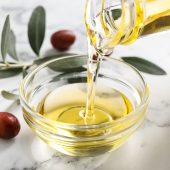“If what a tree or bush does is lost on you, you are surely lost.”
–Anonymous, Native American Poem
The Jojoba plant is native to deserts in North America, but today also grows in Israel, Peru, Argentina and Australia. It can grow in semi-arid regions, as it requires little water and maintenance, and yields a crop of seeds that have several different applications. A lack of understanding about its pollination, how to ensure more female plants than male plants, and how to efficiently irrigate, among other issues, has made it a slow process of establishing it as a stable cash crop, but improvements indicate a more stable future for the plant. Today it is the first native plant since corn to be successfully domesticated.
The color and shape of jojoba seeds are similar to coffee beans, but closer in size to an acorn. Within the seed is a light colored ester—though the product is called jojoba oil, it is technically a wax and contains no triglycerides. Its unique chemical structure makes it liquid at room temperature. Jojoba oil rose to prominence following the ban on whale oil in the 1970s; today it’s considered a superior product to the whale oil of the past. It has high viscosity, a high burn point, and is extremely stable. It is relatively pure upon extraction, and is non-toxic, biodegradable and resistant to rancidity. The oil contains alpha, delta and gamma tocopherols, all forms of Vitamin E.
Native Americans were the first to recognize the myriad benefits of the jojoba seed hundreds of years ago. They most often used the oil squeezed from the seed to treat skin ailments, soften hides and occasionally to stave off hunger during difficult times without food. Since it contains no cholesterol or triglycerides and is not broken down by normal metabolic pathways, it is being studied today as a potential ingredient in diet pills, though ingesting it pure would likely cause gastrointestinal difficulties.
Jojoba oil’s versatile qualities are expanding its use across industries. It has emerged as a compelling lubricant in the auto industry due to its high viscosity at high temperature and pressure. It can also be used as a non-toxic pesticide, forming a waxy protective layer on the leaf or fruit. It replaced whale oil in manufacturing of inks, varnishes, waxes, detergents, resins and plastics.
The jojoba seed is the only plant that produces significant quantities of liquid wax esters similar to the natural esters produced by human sebaceous glands. It is this attribute that has made jojoba oil the darling of the cosmetics industry, as it can be used to effectively protect and lubricate the skin. Most jojoba oil is used in creams and skin treatments or lip balms. It’s also growing in popularity for hair care. Jedwards International carries both Organic and Conventional Golden Jojoba Oil and a colorless Jojoba Oil. The clear product is refined—therefore colorless and odorless— and is most popular with formulators who want to control the purity of the color of their products. Both products are excellent moisturizers for everything from cuticles to scalp. As the cold, drying weather approaches and threatens painfully cracked skin and brittle hair, reap the benefits of an ancient plant that has been protecting and regenerating skin and hair for centuries!

